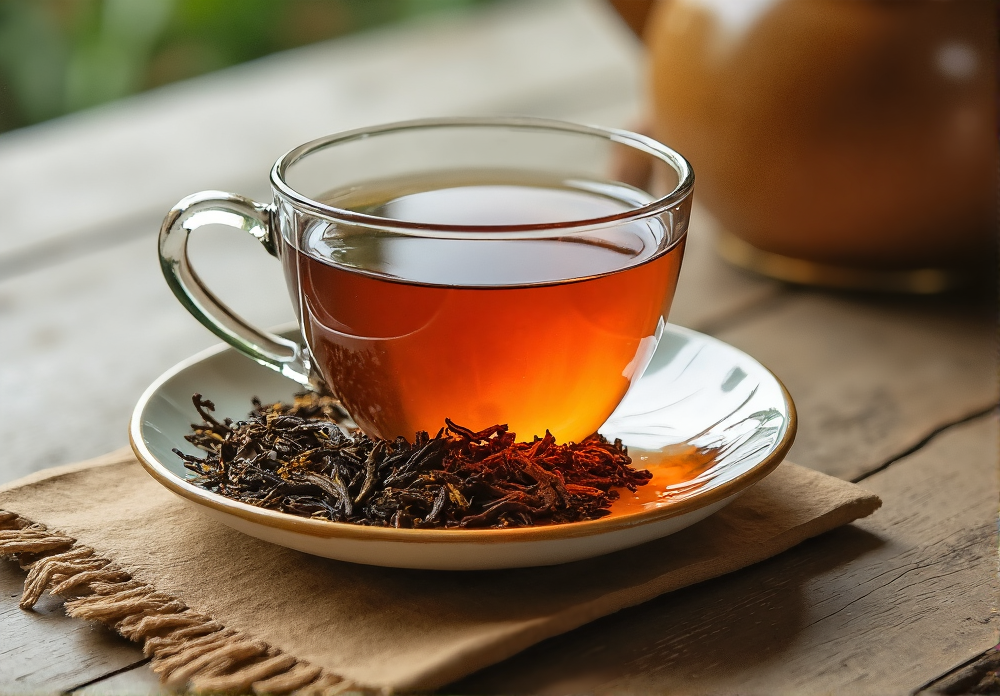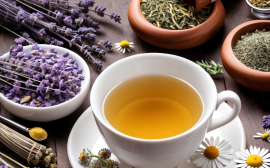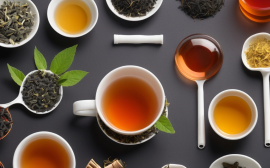Introduction: The Rise of Stress-Relief Teas
In today’s relentlessly fast-paced world, stress has become a pervasive and insidious issue, impacting the well-being of millions. From demanding work schedules and financial pressures to complex social dynamics and global uncertainties, the sources of stress are multifaceted and relentless. Many individuals, recognizing the detrimental effects of chronic stress on their physical and mental health, are actively seeking natural and holistic approaches to manage stress and cultivate a greater sense of balance and well-being. Functional teas, intentionally formulated with stress-relieving ingredients like adaptogens and calming herbs, have emerged as a popular and effective solution in this pursuit of natural stress management. This article delves into the rise of these specialized tea blends, exploring their key ingredients, the scientific evidence supporting their efficacy, and the evolving market trends that reflect their growing popularity. The ancient wisdom of herbal remedies combined with modern scientific understanding has given rise to a new generation of teas designed to address the specific needs of today’s stress-laden society. For instance, the inclusion of Ashwagandha, a revered adaptogen in Ayurvedic medicine, in functional tea blends speaks to this integration of traditional knowledge and contemporary wellness practices. As consumers become increasingly aware of the profound impact of stress on their overall health, they are turning to natural solutions like functional teas to proactively support their well-being. These teas offer a gentle yet powerful way to incorporate stress-relieving rituals into daily life, promoting relaxation and resilience in the face of modern challenges. The readily accessible nature of functional teas, coupled with their delicious flavors and targeted benefits, makes them an appealing choice for individuals seeking natural and effective ways to manage stress and enhance their overall quality of life. Moreover, the growing body of scientific research validating the efficacy of key ingredients like L-theanine and Rhodiola further solidifies the position of functional teas as a valuable tool in the pursuit of stress relief and holistic wellness. From the soothing aroma of chamomile to the grounding effects of ashwagandha, these carefully curated blends offer a personalized approach to stress management, empowering individuals to take control of their well-being and cultivate a more balanced and resilient lifestyle. This exploration of functional teas will shed light on their unique properties, providing insights into how these blends can be incorporated into a holistic wellness routine to effectively combat stress and promote overall well-being.
What are Functional Teas?
Functional teas represent a significant departure from traditional tea consumption, moving beyond simple refreshment to become powerful tools for proactive health management. These specialized tea blends are meticulously formulated with specific ingredients, such as adaptogens, herbs, and other botanical compounds, to target particular health outcomes, with stress reduction being a primary focus. Unlike conventional teas, which primarily offer hydration and mild stimulation, functional teas are designed to deliver tangible wellness benefits, appealing to consumers seeking natural and holistic approaches to health. The growing popularity of functional tea reflects a broader societal shift towards preventative care and a desire for natural remedies that can seamlessly integrate into daily routines.
The core of functional tea’s efficacy lies in its carefully selected ingredients, which often include adaptogens like ashwagandha and rhodiola. These powerful substances help the body adapt to stress by modulating the stress response system, promoting balance and resilience. For example, ashwagandha has been shown to reduce cortisol levels, a key stress hormone, while rhodiola can improve mood and combat fatigue, common symptoms of chronic stress. These adaptogens work synergistically with other herbs and compounds to create a more comprehensive approach to stress management. The inclusion of these ingredients distinguishes functional teas from conventional ones, positioning them as a valuable tool for individuals seeking natural stress relief.
Beyond adaptogens, functional tea blends often incorporate a variety of calming herbs, such as chamomile, lavender, and lemon balm. These herbs are well-known for their relaxing and sedative properties, making them ideal for promoting a sense of calm and tranquility. Chamomile, for instance, contains compounds that bind to receptors in the brain, inducing relaxation and reducing anxiety. Similarly, lavender has been shown to have a calming effect on the nervous system, promoting restful sleep. Lemon balm, with its mild citrusy flavor, also helps to reduce stress and improve mood. The combination of these herbs creates a powerful synergistic effect, enhancing the overall stress-relieving properties of the tea.
Furthermore, the inclusion of L-theanine, an amino acid found in green tea, further enhances the calming properties of functional tea. L-theanine promotes relaxation without causing drowsiness, making it ideal for daily stress management. It works by increasing alpha brain waves, which are associated with a state of relaxed alertness. This makes functional teas containing L-theanine a great option for individuals seeking to stay calm and focused throughout the day. The presence of L-theanine, along with adaptogens and calming herbs, highlights the intentional and science-backed formulation of functional tea blends.
The appeal of functional tea also stems from the growing consumer interest in transparency and sustainability. Many consumers are now seeking tea blends made with high-quality, ethically sourced ingredients, and are willing to pay a premium for products that meet these standards. This has led to a surge in demand for organic and fair-trade certified teas, ensuring that both the environment and the communities involved in tea production are treated fairly. The rise of functional tea is not just a trend, but a reflection of a deeper shift in consumer values towards health, wellness, and sustainability, making it a significant player in the natural remedies market.
Stress-Relieving Ingredients
The efficacy of stress-relief tea blends hinges on a carefully curated selection of ingredients, each chosen for its specific therapeutic properties. Adaptogens like Ashwagandha and Rhodiola are central to many formulations, prized for their ability to modulate the body’s stress response system. Ashwagandha, for example, has been shown in numerous studies to help regulate cortisol levels, the primary stress hormone, while Rhodiola is often used to combat fatigue and improve mental clarity, both common symptoms of chronic stress. These adaptogens work by helping the body adapt to stress, rather than simply masking its effects, making them a cornerstone of functional tea blends designed for stress management. Beyond adaptogens, herbal remedies play a critical role in promoting relaxation and easing tension. Chamomile, a staple in calming teas, is known for its gentle sedative properties, often used to promote sleep and reduce anxiety. Lavender, with its distinctive aroma, is also widely used for its calming effects, and is often found in tea blends designed for evening relaxation. Lemon balm, another popular choice, is known for its ability to soothe the nervous system and promote a sense of tranquility. These herbs provide immediate, noticeable relief, complementing the longer-term benefits of adaptogens. L-theanine, an amino acid predominantly found in green tea, offers a unique approach to stress relief. Unlike some sedatives, L-theanine promotes relaxation without inducing drowsiness, making it ideal for daytime stress management. It works by increasing alpha brain waves, which are associated with a state of relaxed alertness, allowing individuals to remain focused and productive while also feeling calm. This makes it a valuable addition to functional tea blends aimed at promoting both cognitive function and stress reduction. The synergistic effect of these ingredients is often greater than the sum of their individual benefits. For example, a tea blend containing Ashwagandha, chamomile, and L-theanine can offer a comprehensive approach to stress management, addressing both the underlying physiological responses to stress and the immediate symptoms of anxiety and tension. The precise combination of ingredients in a functional tea blend is often the result of careful research and formulation, with brands striving to create products that are both effective and enjoyable. The rising popularity of functional tea blends reflects a growing consumer interest in natural remedies and holistic approaches to wellness. People are seeking alternatives to traditional stress management techniques and are drawn to the gentle, yet effective, properties of these herbal and adaptogenic ingredients. The convenience and accessibility of tea, combined with its inherent health benefits, make it an attractive option for those seeking to incorporate stress-relief strategies into their daily routine. As the market for wellness teas continues to expand, so too does the variety of formulations available, with each catering to different preferences and needs. Consumers are increasingly seeking out tea blends that not only taste good but also offer tangible benefits for stress management, further driving the demand for high-quality, functional tea options. The industry continues to innovate, exploring new ingredient combinations and refining existing formulations to maximize the stress-relieving potential of these natural ingredients.
The Science Behind Stress-Relief Teas
Numerous studies highlight the efficacy of specific ingredients in stress-relief tea blends. Ashwagandha, a revered adaptogen in Ayurvedic medicine, has been shown to significantly reduce cortisol levels, the primary stress hormone. Elevated cortisol levels contribute to various health issues, including impaired sleep, weight gain, and weakened immunity. By modulating cortisol, Ashwagandha helps the body manage stress more effectively and promotes overall well-being. For instance, a study published in the Indian Journal of Psychological Medicine demonstrated a significant reduction in stress and anxiety scores in participants who consumed Ashwagandha extract regularly. Rhodiola, another potent adaptogen, has shown promising results in mitigating stress-related fatigue and improving mood. A study in Phytomedicine found that Rhodiola rosea extract improved stress symptoms and overall well-being in participants experiencing burnout. These findings underscore the potential of adaptogens like Ashwagandha and Rhodiola as natural stress management tools. Beyond adaptogens, calming herbs like chamomile, lavender, and lemon balm offer soothing and relaxing effects. Traditionally used for their calming properties, these herbs have been incorporated into various wellness practices for centuries. Chamomile, known for its mild sedative properties, can promote relaxation and improve sleep quality. Lavender, with its delicate floral aroma, has been shown to reduce anxiety and promote a sense of calm. Lemon balm, often used to alleviate symptoms of stress and anxiety, has demonstrated positive effects on mood and cognitive function. The science behind these botanicals validates their traditional use in promoting relaxation and stress reduction. L-theanine, an amino acid primarily found in green tea, offers a unique mechanism for stress relief. It promotes alpha brain waves, which are associated with a relaxed yet alert state of mind. Unlike sedatives, L-theanine promotes relaxation without causing drowsiness, making it ideal for daytime stress management. Studies have shown that L-theanine can improve attention and reduce stress reactivity, making it a valuable addition to stress-relief tea formulations. The combined effects of these ingredients create a synergistic blend that targets multiple pathways involved in the stress response. This holistic approach enhances the overall stress-reducing potential of functional teas, offering a natural and effective way to manage stress in today’s demanding world. By incorporating these ingredients into daily routines, individuals can experience the profound benefits of these botanical powerhouses and cultivate a greater sense of well-being.
Market Trends and Consumer Preferences
The market for stress-relief tea blends is booming, fueled by a surge in consumer demand for natural wellness solutions and a growing awareness of the profound impact stress has on overall health. This heightened interest in proactive wellness has propelled functional teas, particularly those targeting stress reduction, into the spotlight. Consumers are not just seeking a warm beverage; they are actively searching for effective, natural ways to manage the daily pressures of modern life. Popular brands are responding to this demand by offering a diverse range of formulations catering to various tastes and preferences, from traditional herbal infusions to innovative blends incorporating adaptogens and other potent botanicals. This expanding market reflects a broader shift towards holistic health practices and a desire for personalized wellness solutions. Consumers are increasingly prioritizing high-quality ingredients, sustainable sourcing, and transparent labeling when making purchasing decisions. Certifications like organic, fair trade, and non-GMO are becoming increasingly influential, signifying a commitment to ethical and environmentally responsible practices. For example, brands specializing in adaptogenic teas often highlight the origin and sustainable harvesting methods of ingredients like Ashwagandha and Rhodiola, appealing to consumers who value both efficacy and ethical sourcing. The demand for transparency extends beyond ingredient sourcing to include clear and detailed information about the specific benefits of each ingredient. Consumers are eager to understand the science behind stress-relief teas and how specific components like L-theanine, chamomile, and lavender contribute to relaxation and overall well-being. Educational resources, such as blog posts and articles explaining the mechanisms of action of various herbal remedies and adaptogens, are becoming valuable tools for brands to connect with consumers and build trust. Furthermore, the rise of online marketplaces and direct-to-consumer brands has empowered consumers with greater access to information and a wider selection of stress-relieving tea blends. This increased accessibility, coupled with the growing body of research supporting the efficacy of natural stress management solutions, is expected to further drive market growth in the coming years. As consumers become more discerning and informed about the benefits of functional teas, the demand for innovative and effective stress-relief formulations is likely to continue its upward trajectory. This trend underscores the growing recognition of tea not just as a comforting beverage but as a powerful tool for promoting holistic health and well-being in our increasingly stressful world.
Selecting and Brewing Your Perfect Cup
Selecting the right stress-relief tea blend involves careful consideration of several factors to ensure you’re getting a product that aligns with your wellness goals. Beyond simply choosing a tea based on flavor, delve into the specifics of ingredient sourcing and processing methods. Opt for tea brands that prioritize transparency, providing detailed information about where their ingredients come from and how they are handled. This includes understanding whether the herbs and adaptogens are wild-harvested or cultivated, and if sustainable practices are used to minimize environmental impact. High-quality, sustainably sourced ingredients not only contribute to a more potent and effective tea but also support ethical and environmentally conscious practices within the tea industry. For example, teas that specifically state the origin of their ashwagandha or rhodiola, along with organic certifications, demonstrate a commitment to quality and sustainability. This level of detail is important when you are looking for the best natural remedies for stress management. Certifications such as organic and fair trade provide an additional layer of assurance regarding the product’s quality and ethical production. Organic certifications verify that the ingredients are grown without the use of synthetic pesticides or fertilizers, while fair trade certifications ensure that farmers and workers receive fair wages and working conditions. These certifications are especially relevant when selecting tea blends that contain adaptogens and herbal remedies, as these ingredients are often sourced from various global locations. Look for seals from recognized organizations that verify these claims. Furthermore, it’s beneficial to consider the processing methods used for the tea ingredients. For instance, some herbs may be more potent when dried using specific techniques that preserve their active compounds. Similarly, the way tea leaves are processed can impact their overall quality and flavor profile. Understanding these factors can help you choose a tea that not only provides stress relief but also aligns with your preferences for natural and sustainable products. The future of functional tea blends for stress management is showing incredible promise, with ongoing innovations in ingredient combinations and personalized formulations. We are likely to see more sophisticated blends that combine adaptogens, such as ashwagandha and rhodiola, with calming herbs like chamomile, lavender, and lemon balm, to create synergistic effects. Additionally, the development of personalized tea blends, tailored to individual needs and preferences, is an exciting area of growth. Advances in understanding the interactions between different herbs and adaptogens are also opening doors to more effective and targeted formulations. The integration of technology, such as smart packaging and mobile apps, may also enhance the consumer experience, providing personalized brewing instructions and health tracking features. These innovations aim to optimize the benefits of functional teas for stress relief, making them even more accessible and effective for individuals seeking natural remedies. As consumers become more health-conscious and knowledgeable, the demand for transparency, sustainability, and quality in tea blends will continue to rise, driving further innovation and improvements in this exciting area of wellness.



